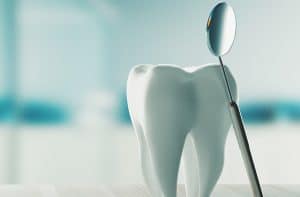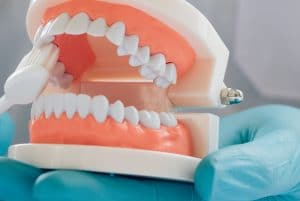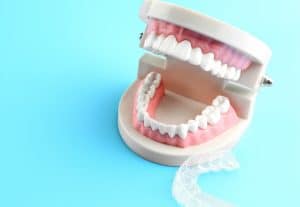 Until you develop a problem like gum disease, it doesn’t seem like the dangers of it are anything to be immediately concerned about. Unfortunately, you won’t always know the moment you develop gum disease, or recognize the signs that it’s already developing among your gum tissues. This is often because gingivitis, the first stage of gum disease, doesn’t generate severe symptoms, and the signs that you might notice won’t always be as intense as they can later become. Today, we examine why gingivitis is something to worry about, and why you shouldn’t hesitate to seek treatment for it if you notice the early signs. (more…)
Until you develop a problem like gum disease, it doesn’t seem like the dangers of it are anything to be immediately concerned about. Unfortunately, you won’t always know the moment you develop gum disease, or recognize the signs that it’s already developing among your gum tissues. This is often because gingivitis, the first stage of gum disease, doesn’t generate severe symptoms, and the signs that you might notice won’t always be as intense as they can later become. Today, we examine why gingivitis is something to worry about, and why you shouldn’t hesitate to seek treatment for it if you notice the early signs. (more…)
When You’re More Likely to Lose a Tooth
 If you could accurately predict the specific problems that your smile will face in the future, then preserving its health and integrity would be a lot simpler. While this might not always be possible, there are ways that you can predict your likelihood of experiencing some of the more severe oral health concerns. For example, tooth loss is often considered the worst-case scenario for certain oral health conditions. If you develop one of these conditions and fail to address it promptly, then you’ll be at much higher risk of losing a tooth, or several of them, as a result. (more…)
If you could accurately predict the specific problems that your smile will face in the future, then preserving its health and integrity would be a lot simpler. While this might not always be possible, there are ways that you can predict your likelihood of experiencing some of the more severe oral health concerns. For example, tooth loss is often considered the worst-case scenario for certain oral health conditions. If you develop one of these conditions and fail to address it promptly, then you’ll be at much higher risk of losing a tooth, or several of them, as a result. (more…)
How Does a Dental Crown Save a Tooth?
 The point of any restorative dental treatment is to successfully restore a tooth’s ability to function properly. This can require different levels of restoration depending on the tooth’s specific concern and the extent of that concern’s impact on the tooth’s health and integrity. Because they’re designed to cap the entire visible structure of a tooth, modern dental crowns are often the ideal solution for achieving this goal with optimal results, and for a wide range of different tooth concerns. (more…)
The point of any restorative dental treatment is to successfully restore a tooth’s ability to function properly. This can require different levels of restoration depending on the tooth’s specific concern and the extent of that concern’s impact on the tooth’s health and integrity. Because they’re designed to cap the entire visible structure of a tooth, modern dental crowns are often the ideal solution for achieving this goal with optimal results, and for a wide range of different tooth concerns. (more…)
When’s the Best Time to Treat a Cavity?
 If you’ve had to deal with a cavity before, then the specific way in which you treated it depends on how severe your cavity was when you treated it. For example, if you treated the cavity in its mild or moderate stage, then the solution was likely a tooth filling, which helps restore your tooth by replacing any natural tooth structure you’ve lost to the cavity. In more severe cases, the structure and tissues that need to be restored are more significant, making your treatment for severe tooth decay more extensive than it would be for a mild cavity. (more…)
If you’ve had to deal with a cavity before, then the specific way in which you treated it depends on how severe your cavity was when you treated it. For example, if you treated the cavity in its mild or moderate stage, then the solution was likely a tooth filling, which helps restore your tooth by replacing any natural tooth structure you’ve lost to the cavity. In more severe cases, the structure and tissues that need to be restored are more significant, making your treatment for severe tooth decay more extensive than it would be for a mild cavity. (more…)
Ways to Improve the Results of Your Hygiene Routine
 The fact that good dental hygiene is important to your oral health isn’t exactly a secret. However, many people can still experience the development of things like tooth decay and gum disease even when they diligently stick to the basics of good dental hygiene. For many people, the problem isn’t that their hygiene routine itself is ineffective, but rather that other things throughout the day often increase their risks to their oral health without them realizing it. Today, we take a look at a few of these factors, and how they can influence the overall results of your dental hygiene routine. (more…)
The fact that good dental hygiene is important to your oral health isn’t exactly a secret. However, many people can still experience the development of things like tooth decay and gum disease even when they diligently stick to the basics of good dental hygiene. For many people, the problem isn’t that their hygiene routine itself is ineffective, but rather that other things throughout the day often increase their risks to their oral health without them realizing it. Today, we take a look at a few of these factors, and how they can influence the overall results of your dental hygiene routine. (more…)
The Serious Dangers that Come with Bruxism
 After grinding your teeth together constantly and consistently, having bruxism can become one of the biggest threats to your long-term oral health. Unfortunately, it isn’t always to tell on your own if you have a bruxism problem, or if you just occasionally grind your teeth out of habit. This can make the dangers of bruxism even more of a threat, as the longer it takes to diagnose and address it, the more damage it may cause to your teeth and oral structures. (more…)
After grinding your teeth together constantly and consistently, having bruxism can become one of the biggest threats to your long-term oral health. Unfortunately, it isn’t always to tell on your own if you have a bruxism problem, or if you just occasionally grind your teeth out of habit. This can make the dangers of bruxism even more of a threat, as the longer it takes to diagnose and address it, the more damage it may cause to your teeth and oral structures. (more…)
Protecting A Chipped Or Cracked Tooth With A Dental Crown
 Restorative dental work addresses more than just tooth decay. If a physical injury damages your tooth, prompt treatment will protect you from potential complications from an infection, or from the tooth suffering additional harm. At our dentist’s office in Dallas, TX, we are prepared to restore teeth that have been chipped or cracked. To protect these teeth, and to make sure you can still bite and chew comfortably, we can place custom dental crowns. Crowns cap teeth above the gum line, guarding them while also taking on bite pressure on their behalf. The materials used to craft these restorations will be strong enough to make sure that your tooth stays protected for many years. (more…)
Restorative dental work addresses more than just tooth decay. If a physical injury damages your tooth, prompt treatment will protect you from potential complications from an infection, or from the tooth suffering additional harm. At our dentist’s office in Dallas, TX, we are prepared to restore teeth that have been chipped or cracked. To protect these teeth, and to make sure you can still bite and chew comfortably, we can place custom dental crowns. Crowns cap teeth above the gum line, guarding them while also taking on bite pressure on their behalf. The materials used to craft these restorations will be strong enough to make sure that your tooth stays protected for many years. (more…)
Your Dental Routine Keeps Teeth Healthy
 Oral health is not a matter of taking one major step. While receiving a dental crown or filling can repair the damage done by bacteria, true oral health is achieved by a consistent dental routine. Having a daily cleaning routine, understanding your dietary habits, and making regular appointments at your dentist’s office are all essential for keeping your teeth healthy and strong. How well you stick to your routine may very well determine the long-term health of your teeth and gums. Do you have a dental routine to keep your teeth healthy? Now is the time to establish one. (more…)
Oral health is not a matter of taking one major step. While receiving a dental crown or filling can repair the damage done by bacteria, true oral health is achieved by a consistent dental routine. Having a daily cleaning routine, understanding your dietary habits, and making regular appointments at your dentist’s office are all essential for keeping your teeth healthy and strong. How well you stick to your routine may very well determine the long-term health of your teeth and gums. Do you have a dental routine to keep your teeth healthy? Now is the time to establish one. (more…)
Questions You Might Have About Dental Implants
 Dental implants have become highly popular among patients who’ve experienced tooth loss, and for many good reasons. However, despite their popularity, there are many things about dental implant-supported restorations that aren’t that obvious. For example, the benefits that they provide to your smile long-term might not be as noticeable as their more immediate benefits. Also, the specific ways in which they enhance a traditional dental restoration are more lifelike and impactful. Today, we help you understand more about the advantages they provide by answering a few common questions about dental implants and how they differ from more conventional bridges and dentures. (more…)
Dental implants have become highly popular among patients who’ve experienced tooth loss, and for many good reasons. However, despite their popularity, there are many things about dental implant-supported restorations that aren’t that obvious. For example, the benefits that they provide to your smile long-term might not be as noticeable as their more immediate benefits. Also, the specific ways in which they enhance a traditional dental restoration are more lifelike and impactful. Today, we help you understand more about the advantages they provide by answering a few common questions about dental implants and how they differ from more conventional bridges and dentures. (more…)
What Would Extracting Your Tooth Resolve?
 There are several reasons why it isn’t a good idea to just extract a tooth that’s giving you trouble. Just because the tooth is fractured, broken, or afflicted with tooth decay doesn’t mean that it should just be removed and replaced with a man-made restoration. However, there are times when extraction is the best way to resolve an issue with your natural tooth structure, and when it is, it’s important not to hesitate. Today, we examine a few issues that tooth extraction could resolve, and why the tooth could become a liability for your oral health if it remains. (more…)
There are several reasons why it isn’t a good idea to just extract a tooth that’s giving you trouble. Just because the tooth is fractured, broken, or afflicted with tooth decay doesn’t mean that it should just be removed and replaced with a man-made restoration. However, there are times when extraction is the best way to resolve an issue with your natural tooth structure, and when it is, it’s important not to hesitate. Today, we examine a few issues that tooth extraction could resolve, and why the tooth could become a liability for your oral health if it remains. (more…)






Recent Comments